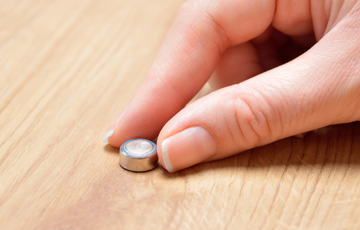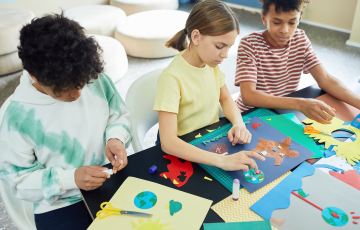School-aged children grow in spurts. They will have leaps in mental and emotional development.
For the most part, the years between six and ten pass smoothly. Your child will refine physical and social skills, gain some emotional maturity, and develop more complex ways of thinking.
- support your child’s physical development. Give her lots of time for unstructured play, exercise and organized sports
- for the best emotional health, continue to provide a nurturing, supportive home for your child
- Teach your child good behaviour by modelling good habits.
- establish healthy limits
- deliver fair and reasonable discipline
- give your child room to develop independence while remaining a close backup for them
- begin talking to your child about body basics and sexuality when they are young - this sets the stage for open communication into adolescence
Behaviour
By the time they are five years old, children have usually developed enough emotional maturity to control their impulses – they should be able to share, listen to simple instructions, and understand expectations.
Their behaviour will not always be golden but they are learning. Much of your child’s behavioural development is about learning how to behave and relate in social situations. For example, Grandma smiles when a child says, “Please.” It is not okay to hit. There are five kids and two swings so we have to take turns.
Ways you can help shape your child’s behaviour:
Control the environment, not the child
It is important to keep your child’s temperament, current moods and behavioural development levels in mind when deciding whether to go out to dinner at Chez Pierre, or to a birthday party with 12 other children.
If the situation is something you know your child will have trouble with, then either go alone, avoid the activity, or change the environment. At the same time it is important to give children opportunities to face new social situations and learn new behaviour skills, but keep your expectations for good behaviour reasonable.
Make your expectations clear
Set firm boundaries and expectations for behaviour, and establish clear, consistent consequences. For example: “If you refuse to say please and thank you, you will not get what you ask for." Or, "If you don’t wear your helmet, you are not allowed to skateboard.”
Discipline with reason and fairness when behaviour is inappropriate
When your child misbehaves, explain to them how their behaviour did not meet expectations, why the rules and expectations are important, and remind them of the consequences they face. Make consequences fair and relate them to the behaviour. Then follow through. For example: “You did not follow the rule of no juice in the living room. The reason we have that rule is so the carpet and furniture are not ruined. You spilled your juice. Turn off the TV and clean up the juice.”
Be aware that physical discipline has been shown to cause serious disturbances in mental and emotional development. Avoid physical punishments.
Emotional
The range of emotional development over a child’s school years will be broad and varied.
The overall goal is for children to have a healthy, strong, and integrated sense of self. This includes positive self-esteem, a belief in their abilities, a healthy sense of sexual development, and appropriate levels of independence and self-reliance.
Ways you can help nurture your child’s emotional development:
Build your child’s self-esteem by supporting his efforts. Warmly recognize his attempts and achievements with encouragement and praise.
- freely express your love and affection for your child
- provide lots of opportunities for your child to learn and build skills
- the chance to do something well is key to the development of positive self-esteem
- talk about emotions
- teach your child healthy, appropriate ways for him to express and deal with anxiety, anger and sadness, as well as excitement and happiness
- stability at home, consistent rules, established routines and clear expectations help your child develop a sense of security, responsibility and belonging
- talk and listen to your child - your relationship is a key element in her emotional development
Healthy Sexuality
Healthy Choices is a program developed by Island Health to help parents teach and encourage healthy sexual development in their children.
Healthy Choices for Six- to Nine-year-olds
Six- to nine-year-olds continue to be fascinated by their body and the bodies of others. “Bathroom humour” is very popular and they want to share it with everyone. While learning more about male and female roles, children start to attach values and labels to these roles. They strongly identify with children of the same gender, conform to peer norms, and begin to develop a sense of sexual orientation. They identify with and can be affected by stories they hear, often in the media, about AIDS, sexual abuse, etc. Sex play and masturbation may continue.
Help your child develop healthy attitudes toward sexuality
- teach your children how the parts of their body work
- children should understand the function of all their body parts including their genitals
- discuss the similarities and differences between boys and girls bodies
- be sure to include the purpose and function of the genital organs of the opposite sex
- find out what they know about sex and human reproduction
- children hear a lot of misinformation on the playground, on TV, and in the movies
- share your values about sexuality and sexual activity
- children need to know more than the ‘birds and the bees’
- children are at an age where they can start to attach values to their world and they should be aware of your values
Healthy Choices for Nine- to Twelve-year-olds
Nine- to twelve-year-olds are getting ready for puberty. On average, girls enter puberty between nine and 13 and boys between 10 and 14. Puberty is the second fastest period of growth humans ever experience, infancy being the first. It is a time of rapid physical, emotional, and social changes.
Pre-teens vacillate between feeling excited or embarrassed about their new body, worried about being normal, happy to be growing up, and confused about sexual feelings. This is often the start of the ‘emotional roller coaster’ for both parents and kids. Peers may become more important than parents in some decisions – especially about clothing, language, recreation and music, but parents still greatly influence other decisions.
Help your pre-teen develop healthy sexuality
- talk with your child about growing up
- discuss the physical, emotional and social changes that will happen during puberty
- discuss the physical changes that are similar for boys and girls during puberty including: increased height and weight, development of underarm and pubic hair, oily hair, oily skin, acne, perspiration and body odour
- discuss the changes that are sex specific
- be sure to provide information on what happens to both boys and girls reproductive systems
- reassure your children that their bodies and sexual development are completely normal
- everyone will go through puberty when his or her body is ready - there is nothing that can be done to speed up or slow down puberty changes
- assist your child with getting ready for puberty
- puberty is hard work; children need good nutrition and lots of sleep
- fluctuating hormones cause perspiration, oily hair, oily skin and acne
- help your child make decisions about showering, deodorant use and acne care
- discuss who is going to be responsible for buying menstrual pads, cleaning of bloody clothing, changing of sheets and laundry
- be aware of what your child is watching and reading about sexuality
- this is the age when children are very influenced by what they see and hear around them
- continue to share your values about sexuality and sexual activity
- respect your child’s increased need for privacy and independence
Physical
During the school years, your child’s physical development is mostly about learning and refining large and fine motor skills.
You can help by making sure your child has a wide variety of creative, play and organized activities such as:
- drawing, painting, knitting, hammering, sewing, and sawing - all these help develop fine motor skills
- learning to play a musical instrument involves a great deal of manual dexterity
- swimming, running, hiking, jumping, climbing
- get your child to do as many large muscle activities as possible every day
Reaching Puberty
As they approach adolescence, your child may start to experience the physical changes of puberty. It’s a good idea to prepare them for this by talking about puberty ahead of time.
Changes in Boys
Testosterone is the male hormone primarily responsible for the changes that occur in boys during puberty.
Changes include: broadening of chest and shoulders and an increase in overall muscle mass. Scrotum, testicles, and penis grow. Boys experience erections, ejaculations and nocturnal emissions (wet dreams-ejaculations during sleep) as their body practices for reproduction.
Changes in Girls
Estrogen is the female hormone primarily responsible for the changes that occur in girls during puberty.
Changes include: hips widen as the pelvic bone changes shape, breasts develop, and fat tissue is increasing around hips, thighs, buttocks, and breasts. Girls’ reproductive organs change and the vulva, uterus, and vagina grow, ovaries mature and menstruation starts.



